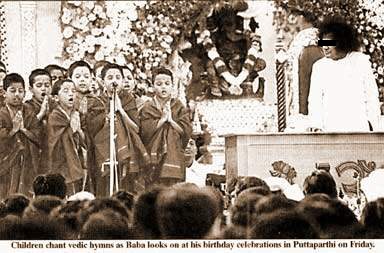Sai Baba Trickery goes
on Air, keep
away from the radio!

Boys, boys, boys...
Date: February 10, 2002
http://www.geocities.com/priyasai108/bnews/birth-news.htm
Document date: PUTTAPARTHI, NOV. 23, 2001.
Just an excerpt of the article:
During the News - Convocation and Birthday Celebrations in Puttaparthi, November 23 2001, Sai Baba inaugurated the "Radio Sai Global Harmony", a digital radio network, by pressing a switch.
Sai Baba Gospel Goes on Air
PUTTAPARTHI, NOV. 23. To spread the message of peace from Sri Satya Sai Baba, the World Space Organization, USA, has launched a digital audio satellite communication system - "Radio Sai Global Harmony" here on Friday. The digital radio network will broadcast the gospel of Sri Sai Baba in all the main languages of the world round the clock.
The radio network was launched by Sri Sai Baba by
pressing a switch.The broadcast of the new radio station began with the playing back of
signature music. Later, a song in Telugu sung by the students of Sri Satya Sai Institute
of Higher Learning greeting Sai Baba on his birthday was played back.
Dr. Michael Nobel, son of the legendary Alfred Nobel and the Chairman of the governing
body of the Board of Nobel Societies, one of the patrons of the radio network, said the
World Space Organization already had two satellites - Asiasat and Africastar covering
about 4 billion population. A launch of another satellite soon would cover the population
in America.
He said the radio network would spread the message of Sai Baba all over the world and
propagate global harmony and peace. Mr. V. Srinivasan, the former president of
Confederation of Indian Industry and another patron of the radio network, also spoke.
Sai Global Harmony launched by Sri Sathya Sai Baba
Source: The Times of India 24 November 2001
Dr Michael Nobel, Head of the Nobel Institution and Director, Worldspace, told the Times
of India, the things that Baba has done is simply amazing and this channel will spread his
message to the world. He said there would be an explosion of his teachings. "I am
confident it will have a lasting impact." Dr Nobel said the channel now offers the
reach to take his message to billions in the world. Speaking on the birthday celebrations,
Dr Nobel said, 'this is something Europeans are not used to. I have never seen such an
impressive presentation; the large crowds keeping so quiet and scale of devotion is
extraordinary, he said.
C. Srinivas, member of the Sri Sathya Sai Central Trust, expressed happiness and said,
this channel will carry Baba's message of love and peace to the world. Srinivas has been
actively involved in many large projects of the charitable institutions including the
super specialty hospitals.
M.S. Chandrasekhar, Executive Vice President and Co-COO, Worldspace, said efforts were on
to set up uplinking facilities here that will make it possible to broadcast live from
Prashanti Nilayam, Baba's Puttaparthi Ashram.
FM radio cities to be doubled, SW to be phased out.
The Financial
Express, January 11 (or 16?), 2002.
As recommended by the Tenth Plan Working Group, short wave radio would be phased out in
the country. It is in keeping with the global trend of doing away with short wave radio in
the analogue mode. To fill in the gap, FM service would be introduced in 125 more cities
during the Tenth Plan, according to a senior All India Radio (AIR) official. This is
subject to the
government's approval of the Tenth Plan.
With FM radio present in 128 cities now, there are plans to double the number of FM cities
during the Tenth Plan period, an official said. The medium wave
service, which has been the most popular band till the time FM took off in India, would
also be expanded, but only in the border areas.
High-power medium wave stations would be launched in the border areas of the country
during the Tenth Plan period, again subject to its approval. Such
high-powered stations would be able to catch the medium wave frequency of other countries
as well, thereby making it a very meaningful service for the
border areas.
AIR peddles FM time slots to private operators in non-metros
The Financial
Express, January 11 (or 16?), 2002.
In a bid to diversify sources of revenue, All India Radio (AIR) has decided to offer
chunks of program time on its FM channels in non-metro cities to private operators for
entertainment programming, according to the head of AIR Resources - Hari Om Srivastava.
AIR has excluded the metro cities from this offer anticipating protests from existing
private operators who have paid high premium to secure FM licences for 24-hour radio
channels. AIR operates FM stations at 128 places. Leaving the metro channels out, there
are 124 cities in which slots are being offered to private operators. The commercially
attractive ones are, however, likely to be limited to 70-odd cities. These are the same
cities in which 24-hour FM channels are proposed to be auctioned to private operators in
the second round of privatization, likely in the latter half of 2002.
Dr. Srivastava said that it would offer an opportunity to the prospective bidders to test
the waters. There are some players who would not like to operate a 24-hour channel and are
just interested in offering a few hours of programming everyday. The time slots are
initially for a few hours in the morning, afternoon and evening. Currently, there are
three maintenance shifts on AIR FM channels in non-metros during which there is no
transmission.
The Satellite Media Network is on http://www.worldspace.com